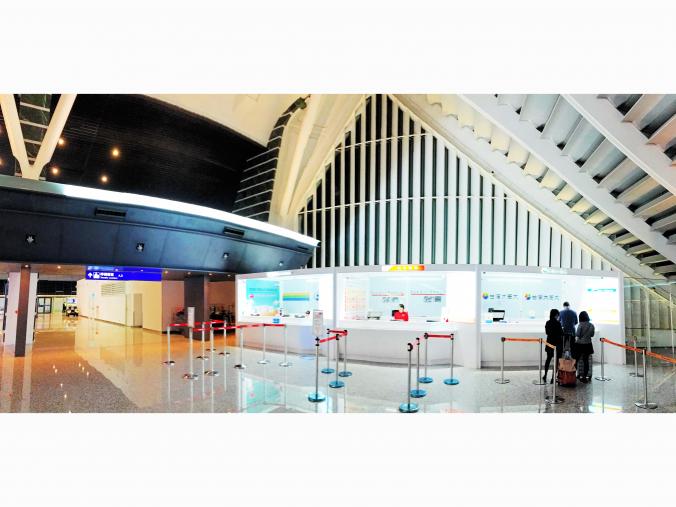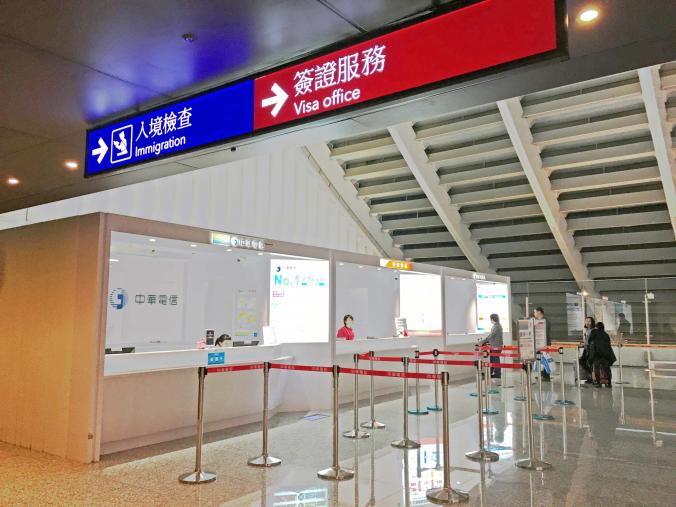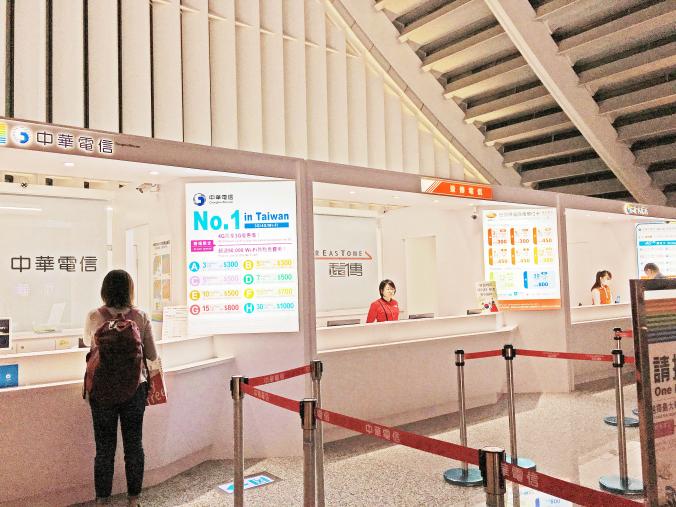Called 預付卡, yù fù kǎ, prepaid SIM cards are easily accessible in Taiwan for a relatively low startup cost. SIM cards can be purchased in city shops, at the airport, E-SIM online (no ID required), or E-SIM (with registration on local Chunghua 中華電信) with a simple pickup at the airport. Getting a data plan is easy, but make sure to check all the available plans before choosing.
When applying for a prepaid SIM card, remember to bring two forms of ID. A passport and secondary form of ID such as a national ID card (i.e. Singaporean NRID, Malaysian MyKad, etc.) or other state-issued form of ID such as a driver's license are recommended. Phone numbers are only available to customers that register an ID with one of the local providers. The other SIM cards or E-SIM services that do not require ID registration are only for data which will function quickly and well, but may not be a Taiwanese IP address. For most visitors, this is not a concern, although some may find it interesting to see Netflix on their smartphone all in Thai!
The airport SIM card desk closes at normal closing hours, so visitors arriving late or in a rush are recommended to first reserve an E-SIM online that can activate without an ID registration.
Chunghua Telecom (中華電信) is the recommended provider for visitors due to the best quality of service and coverage. Visitors always appreciate having constant, reliable mobile phone service. Either choose a Chunghwa E-SIM or service that roams on Chunghwa.
Using an unlimited data SIM is safer and more secure than connecting to public WiFi. When connecting to WiFi that you are not in charge of, there is the potential for other users on that WiFi to snoop and possibly view your data and/or steal passwords. When connecting to WiFi, always make sure there is a password, as connections without passwords are completely insecure and may be a honeypot where the owner specifically sets up free WiFi to steal user info. As mobile service in Taiwan is inexpensive, we recommend everyone to be safe and get a dedicated SIM.
Chunghwa (中華電信) VS. Taiwan Mobile (台灣大哥大) VS. FarEast (遠傳)
If traveling mainly in Taipei City or other larger cities, service across all three will be consistent. In general, service quality is excellent with fast internet speeds, especially in areas with less network congestion. Due to Taiwan's mountainous topography, areas outside city centers will have varying levels of service. For travelers visiting to mountainous areas, Chunghwa is the preferred network.
FarEast and Taiwan Mobile are generally cheaper options and may offer more promotions, especially for those looking for post-paid contracts. Chunghwa has the best level of service, however, is more expensive. Within the city, the differences between the providers is minimal, and FarEast or Taiwan Mobile may provide better or worse connectivity to overseas Internet services since both are separated from Chunghwa's HiNet network.
5G Services
At the moment, 5G services are offered by the major carriers, however the carriers tend to categorize 5G services as being distinct from LTE services.
How to choose a SIM card:
If your party will be traveling outside Taipei or other city areas, consider a Chunghwa SIM card. Since shops are harder to find in comparison to the other providers, consider reserving online for pickup at the airport. The price is higher than the other two, but service will be more reliable in the mountains.
If your party will mainly be in the city or visiting popular spots, consider a Taiwan Mobile or FarEast SIM card. Service is more affordable and shops are more available, and tethering WiFi is allowed with cheaper data packages. Both SIM cards are also available for pickup at the airport (TW Mobile, FarEast).
Technical Details:
Taiwan's LTE providers operate by using the FDD-LTE world standard and is not compatible with China TDD-LTE. TDD-LTE phones will have issues using LTE in Taiwan as only Far-East supports TD-LTE on one frequency, and may be downgraded to 3G unless the handset also supports FDD-LTE. LTE network evolution categories in Taiwan are Category 6, except Chunghwa which is Category 11. Taiwan Mobile and FarEast offer VoLTE (using LTE for audio calls) service as a premium. 3G data services (including W-CDMA and HSPA+) were terminated at the end of year 2018 in a government effort to increase available frequencies for future development, so only LTE-focused services will be available and handsets which do not support 4G LTE standards will not be operational.
The following bands and frequencies are supported by each provider:
| Provider | Supported Frequencies | ||||
|---|---|---|---|---|---|
| Chunghwa (中華電信) | Band 1 2100MHZ |
Band 3 1800MHZ |
Band 8 900MHZ |
Band 7 2600MHZ |
|
| Taiwan Mobile (台灣大哥大) | Band 1 2100MHZ |
Band 3 1800MHZ |
Band 28 700MHZ |
||
| FarEast (遠傳) | Band 1 2100MHZ |
Band 3 1800MHZ |
Band 28 700MHZ |
Band 7 2600MHZ |
|
Chunghwa's Data+WiFi packages also offer connections at 50,000 APs (access point) all over Taiwan. However, for online security, be careful about connecting to WiFi hotspots you are not in control of. With unlimited data, the WiFi component most likely will not be utilised by travellers, and must be activated first by dialling 5397.
Chunghwa's customer service can be reached by calling 928. To change language, call 928, choose 4, then choose 1 for Chinese (華語), 2 for English, 3 for Japanese (日本語), 4 for Thai (ภาษาไทย), 5 for Vietnamese (Tiếng Việt), and 6 for Indonesian (Bahasa Indonesia).
Prepaid Shortcodes for Taiwan Mobile (台湾大哥大):
Customer Service: 188
Check Credit Balance: *867#
Check Remaining Data (Subscription): *837*30#
Check Remaining Data (Bucket): *867*100#
7/11 now sells SIM cards. 7-Mobile SIM cards are currently the most convenient cards to recharge, and also provide access to WiFi at all 7/11 locations. Visitors report that getting SIM cards at 7/11 requires usage of the iBon machine to scan a passport and secondary ID, then a waiting time is required as the documents are processed. Also, the system is only available in Chinese.


